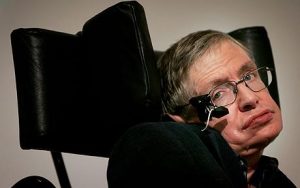
English Physicist Professor Stephen Hawking
Aditya Vaibhav: Considered no less than a medical marvel and having lived for more than half a century with the devastating condition motor neuron disease, English physicist, Professor Stephen William Hawking passed away in Cambridge at 76. Professor Hawking became a household name after publishing his 1988 book, A Brief History of Time.
Contributions
His scientific endeavors include collaboration with Roger Penrose on gravitational singularity theorems in the framework of general relativity and the theoretical prediction that black holes emit radiation, often called Hawking radiation.
READ MORE: Doomsday Approaching, Warns Hawking
Professor Hawking was the first to set out a theory of cosmology explained by a union of the general theory of relativity and quantum mechanics. He was a vigorous supporter of the many-worlds interpretation of quantum mechanics.
Early life
Professor Hawking was born in Oxford on January 8, 1942, where his parents had decamped from north London for him to be born away from the worst of the wartime bombing raids. At 8, the family moved to St Alban’s, attending school before going on to Oxford University.
How Professor Hawking defeated ALS?
While still studying at Oxford, he became increasingly clumsy, falling down the stairs and having trouble rowing. His speech started to slur only to be later diagnosed with amyotrophic lateral sclerosis (ALS), a form of motor neuron disease, aged just 21, in 1963.
Fighting all odds, Professor Hawking went on to Cambridge University to study Cosmology gaining his PhD and becoming a research fellow and lecturer.
READ MORE: Environment & Culture: Aspects of the Same Coin
Interestingly, the doctors gave him a life expectancy of just two years – but incredibly he lived with the condition for more than 50 years making experts refuse to believe he had ALS as his lifespan has exceeded any expectations. Fighter in a true sense!
Bringing boring theorems of Physics to masses
Professor Hawking wanted to bring the story of the universe to the masses with his best-selling book, A Brief History of Time. Most notable amongst his contributions have been on the basic laws which govern the universe – including theories about the Big Bang and black holes.
Total Views: 2,89,785


